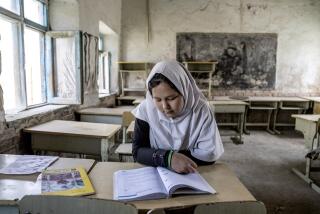Motley Cast Wins Russian Broadcast License
In what is widely seen as a Kremlin-orchestrated effort to end Russia’s unseemly media wars, the country’s Press Ministry granted a broadcast license Wednesday to a mix-and-match consortium of Kremlin critics and supporters.
The resolution--if it is one--appears inspired less by King Solomon than Dr. Frankenstein: It splices together an award-winning journalist, a former Soviet spymaster and a motley crew of oligarchs with little in common except an apparent desire to quell criticism that the Kremlin is stifling independent media.
“I think the competition was honest,” said Yevgeny M. Primakov, former prime minister and Soviet foreign intelligence chief, who helped cobble together the winning tender. “What we need to do now is to put together a team that will be public and global in the full sense of the word--without pressure from the government, without pressure from the oligarchs, without any pressure at all.”
The winners are fronted by controversial TV anchorman Yevgeny Kiselyov, once the Kremlin’s harshest critic, who in recent weeks and days has seemed uncharacteristically compliant. Formerly Russia’s leading journalist, Kiselyov has been dethroned twice in the last year--first from the country’s leading independent network, NTV, and a second time from a smaller station, TV6, where he had taken shelter with many of his former colleagues.
“On the outside, the situation looks rather funny,” said Pavel I. Voshchanov, a political analyst and former presidential spokesman. “The authorities ended up with something they had been trying very hard to get rid of--the Kiselyov team is back on the air. But this is only a superficial impression. Although everything looks the same on the outside, on the inside everything has changed.”
Kremlin officials, including President Vladimir V. Putin, have insisted that they had nothing to do with the financial and legal maneuverings that led to the downfall of NTV last year and of TV6 in January.
But few in Russia doubt that the government entities that led the campaigns--the gas monopoly Gazprom in the case of NTV and the Press Ministry in the case of TV6--were operating at the Kremlin’s behest. Both TV companies were owned by oligarchs who were not-so-subtly denounced by Putin as exerting unwelcome influence over their media holdings: Vladimir A. Gusinsky and Boris A. Berezovsky.
Observers noted that since Gusinsky and Berezovsky owned most of the influential non-state media, any attack on their holdings was an attack on independent journalists.
The idea behind Media-Sotsium, as the new consortium is called, apparently was designed to demonstrate that the target was not Kiselyov by finding a way to put him back on the air without the financial backing of Gusinsky and Berezovsky. The consortium members are supposed to represent diverse views and financial interests, part of an effort to keep Kiselyov and his team from being beholden to any of them.
The consortium’s senior figure is Primakov. In 1999, when the leadership of the Kremlin was in contention, Primakov was seen as Putin’s toughest challenger--until his chances were destroyed by a smear campaign on the Kremlin-backed ORT network.
Since then, Primakov’s political movement has mellowed into a soft, pro-Kremlin centrism. He apparently was seen as an adequately neutral public figure to lead the nonprofit consortium, despite his frequent diatribes at reporters whom he considers disloyal or unseemly.
“It’s widely known how [Primakov] feels about journalists,” said Andrei Norkin, a former NTV anchorman who put in one of more than a dozen bids for the contract.
The business side of the winning consortium is headed by Arkady I. Volsky, chairman of the Russian Union of Industrialists and Entrepreneurs, a Kremlin-endorsed group of business leaders. Since Putin has been in office, the union has been seen as a Kremlin vehicle to dilute and restrain the power of the oligarchs.
Media-Sotsium won the tender by a unanimous vote by a panel appointed by the Press Ministry. Panel member Manana Aslamazyan, director of Internews, a nongovernmental organization that supports independent mass media, said that despite the apparent consensus, members debated long and hard before voting because they felt indirectly manipulated by the Kremlin.
“What triggered the doubts in our heads was how the merger of a group of journalists and a group of oligarchs under the supervision of pro-government people very loyal to the authorities could work,” Aslamazyan said afterward. “Isn’t there a great threat to the independence of journalists? Will they not be made to do something that would go counter to their convictions and their beliefs?”
Many observers suggested that the consortium, like other marriages of convenience, may soon be strained.
“For the oligarchs, the tender was by no means a business enterprise. They have their other businesses, which they use to make money,” said Norkin. “So it must be all about politics. And this means that a new attempt will be made to turn journalists into a political tool.”
Alexei V. Kuznetsov in The Times’ Moscow Bureau contributed to this report.
More to Read
Start your day right
Sign up for Essential California for news, features and recommendations from the L.A. Times and beyond in your inbox six days a week.
You may occasionally receive promotional content from the Los Angeles Times.






